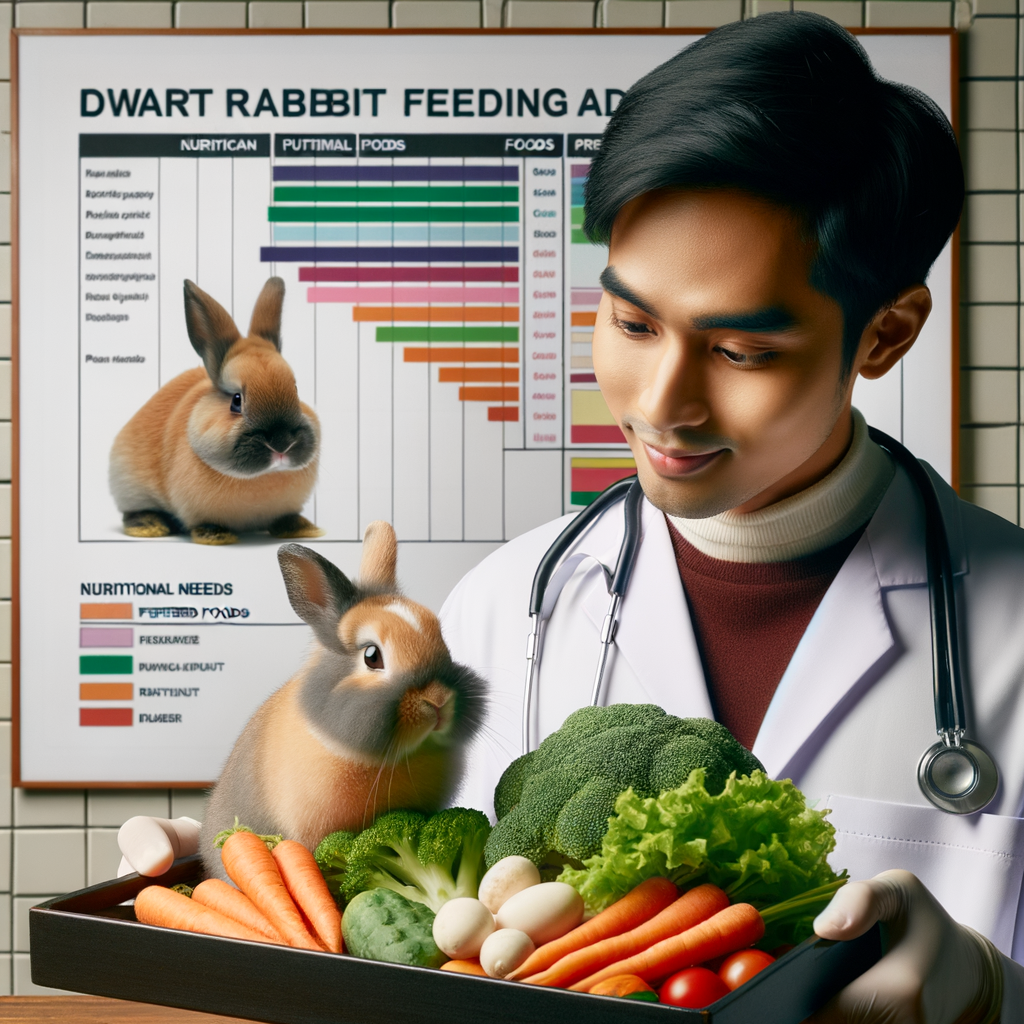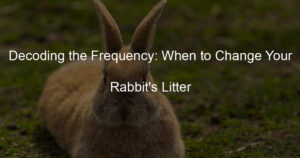
Understanding Dwarf Rabbit Diet
Feeding your dwarf rabbit correctly is crucial to their overall health and well-being. This section will delve into the importance of a balanced diet, common food preferences, and essential nutrients required in a dwarf rabbit’s diet.
- Importance of a Balanced Diet for Dwarf Rabbits
- Common Dwarf Rabbit Food Preferences
- Essential Nutrients in Dwarf Rabbit Nutrition
A balanced diet is vital for your dwarf rabbit’s health. It helps maintain their weight, keeps their teeth in good condition, and ensures they get the right amount of nutrients. A proper diet can also prevent diseases like gastrointestinal stasis, a common issue in rabbits that can be fatal.
Like humans, dwarf rabbits have their food preferences. They typically enjoy a variety of hay, fresh vegetables, and a small portion of fruits. Hay should make up the majority of their diet, as it helps with digestion and dental health. Vegetables provide essential vitamins and minerals, while fruits, due to their high sugar content, should be given sparingly as a treat.
There are several key nutrients that a dwarf rabbit needs. These include fiber, which aids digestion; protein for growth and repair; and a balance of vitamins and minerals for overall health. Here’s a simple table to help you understand:
| Nutrient | Role in Rabbit’s Health |
|---|---|
| Fiber | Aids in digestion and helps maintain dental health |
| Protein | Supports growth and repair of tissues |
| Vitamins and Minerals | Supports overall health and well-being |
In conclusion, understanding your dwarf rabbit’s dietary needs is crucial to ensuring they live a long, healthy life. Remember, a balanced diet, knowing their food preferences, and providing essential nutrients are key factors in your rabbit’s nutrition.
Challenges with Picky Eater Rabbits
Dealing with a fussy eater can be a daunting task, especially when it comes to our furry friends. Rabbits, particularly dwarf rabbits, are known for their selective eating habits. This can pose various challenges for their owners. Let’s delve into the world of picky eater rabbits and understand the issues related to it.
- Identifying a Fussy Eater
- Common Causes of Picky Eating in Rabbits
- Impact of Picky Eating on Dwarf Rabbit Health
Recognizing a picky eater rabbit is the first step towards addressing the issue. Rabbits are naturally selective eaters, but when your rabbit consistently refuses certain types of food, especially those essential for their health, it may be a sign of a fussy eater. Look out for signs like leaving out certain foods, eating less, or showing a sudden change in eating habits.
There are several reasons why your rabbit might be a picky eater. It could be due to health issues like dental problems or gastrointestinal disorders. Sometimes, it could be a result of a poor diet, lack of variety in food, or even stress. Understanding the root cause is crucial to address the problem effectively.
Picky eating can have serious implications on the health of your dwarf rabbit. Rabbits need a balanced diet to stay healthy. A diet lacking in essential nutrients can lead to health problems like obesity, malnutrition, and digestive issues. In severe cases, it can even lead to a shortened lifespan.
It’s important to remember that dealing with a picky eater rabbit requires patience and understanding. The key is to identify the cause and work towards a solution that ensures your rabbit gets a balanced diet for a healthy and happy life.
Encouraging Your Rabbit to Eat
One of the most important aspects of rabbit care is ensuring that your pet is eating properly. It’s not just about what they eat, but also how and when they eat. Let’s delve into how to create a comfortable feeding environment for your rabbit.
Creating a Comfortable Feeding Environment
Creating a comfortable feeding environment for your rabbit is crucial in encouraging them to eat. This involves providing a quiet, stress-free environment and establishing a consistent feeding schedule and routine.
- Importance of a Quiet, Stress-free Environment
- Feeding Schedule and Routine
Rabbits are naturally timid creatures. They prefer quiet and calm surroundings, especially when they are eating. A noisy, chaotic environment can cause stress and anxiety in your rabbit, which can discourage them from eating. Therefore, it’s essential to provide a peaceful and quiet space for your rabbit to enjoy their meals.
Just like humans, rabbits thrive on routine, especially when it comes to their feeding schedule. Feeding your rabbit at the same times each day can help them feel secure and encourage them to eat. Try to establish a routine that fits your schedule and stick to it. Remember, consistency is key when it comes to feeding your rabbit.
In conclusion, creating a comfortable feeding environment for your rabbit involves providing a quiet, stress-free environment and establishing a consistent feeding schedule. By doing so, you can encourage your rabbit to eat and ensure they are getting the nutrition they need.
Introducing New Foods to Your Rabbit
Introducing new foods to your rabbit’s diet can be a daunting task. However, with patience and careful observation, you can successfully broaden your pet’s culinary horizons. Here are some steps to guide you through this process.
- Start with Small Portions
- Gradually Increase the Variety
- Monitor Your Rabbit’s Reaction
When introducing a new food to your rabbit, begin with small portions. This allows your rabbit to get used to the new taste and texture without overwhelming their digestive system. For instance, if you’re adding a new vegetable, start with a piece about the size of your thumb. Remember, sudden changes in diet can cause digestive problems in rabbits, so it’s crucial to take this step slowly.
Once your rabbit has adjusted to the new food, you can start adding more variety. Introduce one new food at a time, and wait a few days before adding another. This gives you time to observe your rabbit and ensure they’re not having any adverse reactions. For example, after successfully introducing carrots, you might want to try adding bell peppers or cucumbers next.
It’s important to closely monitor your rabbit’s reaction to new foods. Look for changes in their behavior, such as loss of appetite or lethargy, which could indicate discomfort. Also, check their droppings for any changes in size, color, or consistency, as these can be signs of digestive issues. If you notice any negative reactions, stop feeding the new food and consult your vet.
In conclusion, introducing new foods to your rabbit should be a gradual and careful process. By starting with small portions, gradually increasing the variety, and closely monitoring your rabbit’s reaction, you can ensure a smooth transition and a healthy, happy pet.
Rabbit Feeding Tips
Feeding your rabbit correctly is essential for their health and happiness. Here are some key tips to help you understand and meet your rabbit’s unique dietary needs, choose high-quality rabbit food, and supplement their diet with fresh fruits and vegetables.
- Understanding Your Rabbit’s Unique Dietary Needs
- Choosing High-Quality Rabbit Food
- Supplementing with Fresh Fruits and Vegetables
Rabbits have a unique digestive system that requires a specific balance of nutrients. They need a diet high in fiber to keep their digestive system functioning properly. The majority of their diet should consist of hay, which provides the necessary fiber and helps to grind down their constantly growing teeth. They also need a small amount of fresh vegetables for additional vitamins and minerals, and a smaller portion of rabbit pellets for protein and extra nutrients.
When choosing rabbit food, it’s important to look for high-quality products that meet your rabbit’s nutritional needs. Hay should be the main component of their diet, and it should be fresh, clean, and free from mold and dust. Rabbit pellets should be high in fiber and low in fat and sugar. Avoid muesli-style foods, as they can lead to selective feeding and nutritional imbalances. Always check the ingredients and nutritional information on the packaging to ensure you’re choosing the best food for your rabbit.
While hay and pellets should make up the majority of your rabbit’s diet, fresh fruits and vegetables are also important. They provide additional nutrients and variety, and can be a great way to encourage your rabbit to eat. However, not all fruits and vegetables are safe for rabbits, and some should only be given in moderation. Leafy greens like romaine lettuce, kale, and spinach are good choices, while fruits like apples and pears can be given as occasional treats. Always introduce new foods slowly and watch for any signs of digestive upset.
Remember, every rabbit is unique and may have different dietary needs and preferences. Always consult with a vet or a rabbit nutrition expert if you’re unsure about what to feed your rabbit.
Dwarf Rabbit Care Beyond Diet
While a balanced diet is crucial for your dwarf rabbit’s health, there are other aspects of care that are equally important. Let’s delve into these aspects, which include regular exercise, routine vet check-ups, and mental stimulation.
-
Regular Exercise for Your Dwarf Rabbit
Exercise is vital for your dwarf rabbit’s overall health and well-being. It helps keep their heart healthy, muscles strong, and mind sharp. A rabbit should have at least 3-4 hours of exercise outside their cage every day. This could be as simple as letting them hop around in a rabbit-proofed room or a secure outdoor area. Remember, exercise isn’t just about physical health; it’s also a chance for your rabbit to explore and satisfy their natural curiosity.
-
Importance of Regular Vet Check-ups
Regular vet check-ups are essential to ensure your dwarf rabbit stays healthy. A vet can spot early signs of illness that you might miss. They can also provide advice on diet, exercise, and other aspects of care. It’s recommended to take your rabbit for a check-up at least once a year. However, if you notice any changes in their behavior or eating habits, it’s best to schedule a visit sooner.
-
Providing Mental Stimulation for Your Rabbit
Mental stimulation is just as important as physical exercise for your rabbit’s health. Rabbits are intelligent creatures that need challenges and stimulation to prevent boredom and depression. You can provide mental stimulation by offering a variety of toys, changing their environment regularly, and spending quality time interacting with them. Puzzle toys, digging boxes, and tunnels are all great options to keep your rabbit mentally engaged.
In conclusion, caring for a dwarf rabbit goes beyond just providing a balanced diet. Regular exercise, routine vet check-ups, and mental stimulation are all crucial for their health and happiness. By paying attention to these aspects of care, you can ensure your furry friend leads a long, healthy, and fulfilling life.
Case Studies: Successful Dietary Changes for Picky Eater Rabbits
Let’s delve into some real-life examples of how rabbit owners have successfully managed to change the dietary habits of their picky eater rabbits. These case studies will provide you with practical insights and strategies to apply in your own situation.
-
Case Study 1: Introducing Variety in Diet
Meet Bella, a two-year-old dwarf rabbit who was extremely picky about her food. Her owner, Lisa, decided to gradually introduce a variety of foods into Bella’s diet. She started by adding small amounts of new vegetables to Bella’s favorite foods. Over time, Bella started accepting the new foods. Lisa also made sure to rotate the types of vegetables and hay to keep Bella’s diet varied and nutritious.
-
Case Study 2: Overcoming Fear of New Foods
Next, we have Max, a dwarf rabbit who was afraid of trying new foods. His owner, John, used a technique called ‘positive reinforcement’. Every time Max tried a new food, John would reward him with his favorite treat. This helped Max associate new foods with positive experiences, and he gradually overcame his fear.
-
Case Study 3: Managing Health Issues Through Diet
Lastly, we have Daisy, a rabbit who was suffering from obesity. Her owner, Sarah, decided to manage this health issue through diet. Sarah reduced the amount of pellets and increased the amount of hay in Daisy’s diet. She also introduced more leafy greens and fewer starchy vegetables. Over a period of six months, Daisy lost weight and became healthier.
These case studies highlight the importance of patience, persistence, and creativity in managing the diet of picky eater rabbits. Remember, every rabbit is unique and what works for one may not work for another. The key is to try different strategies and find what works best for your rabbit.
Key Takeaways: Ensuring a Healthy Rabbit Diet
As we conclude our discussion on maintaining a healthy diet for your rabbit, let’s summarize the key points we’ve covered. These takeaways will help you better understand your rabbit’s dietary needs, encourage healthy eating habits, and monitor your rabbit’s health and well-being.
- Understanding Your Rabbit’s Dietary Needs
- Encouraging Healthy Eating Habits
- Monitoring Your Rabbit’s Health and Well-being
Rabbits have unique dietary needs that must be met for them to remain healthy. They require a diet rich in hay, fresh vegetables, and a small amount of pellets. Hay should make up about 70% of their diet as it aids in digestion and dental health. Fresh vegetables provide necessary vitamins and minerals, while pellets offer concentrated nutrition.
Encouraging your rabbit to eat a balanced diet can be a challenge, especially if they are picky eaters. Offering a variety of fresh vegetables can help stimulate their appetite. It’s also important to limit treats and unhealthy foods. Remember, consistency is key in establishing healthy eating habits.
Regularly monitoring your rabbit’s health is crucial. Pay attention to their eating habits, weight, and behavior. Any changes could indicate a health issue. Regular vet check-ups are also essential to ensure your rabbit is in good health. Remember, a healthy diet is a significant part of your rabbit’s overall well-being.
In conclusion, understanding your rabbit’s dietary needs, encouraging healthy eating habits, and monitoring their health are all key to ensuring a healthy rabbit diet. By following these guidelines, you can provide your rabbit with the best possible care and help them live a long, healthy life.




